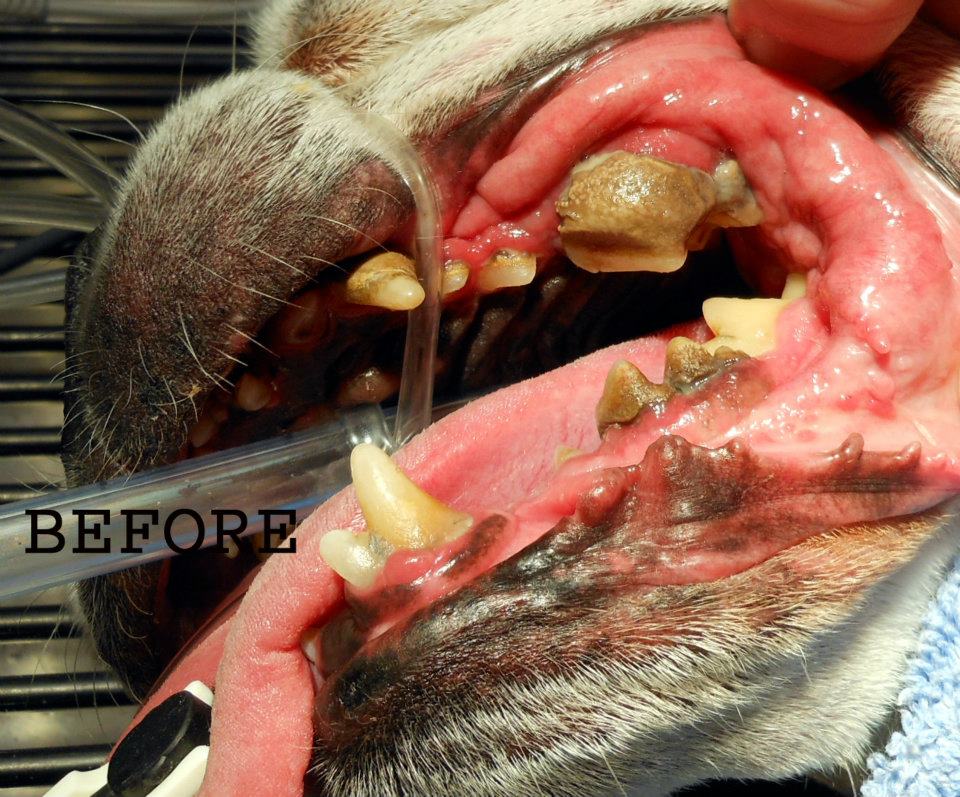Dental Special in February
By 3 years of age, 85% of our pets have periodontal disease. Unfortunately, this means your pet probably is affected.
How do you tell if your pet has periodontal disease? It's easy--does your pet have bad breath? If you flip your pet's lip up and look at his teeth, can you see unsightly tartar? inflamed/bleeding gums? Does your pet resist his muzzle being handled, due to pain? Is your pet no longer playing with his toys?

At the start of the dental: the tartar caps are so thick that they're irritating the dog's cheek lining. Notice the intense red/purple color of the gums above the huge tartar cap? That's a signal that something major is wrong in the area.

Wow! What a difference! The major tooth at the back of the upper left jaw has root exposure and extensive infection of the surrounding tissue. The tooth was sectioned and removed. Soon, this dog will be able to chew in comfort again..
There are a variety of reasons so many of our dogs and cats are affected with periodontal disease.
The primary risk factors for periodontal disease in dogs are Small Mouth/Crowded Mouth/Hairy Mouth. In other words, a small dog (like a Yorkie), a dog with a snub nose (and, therefore, crowded/crooked teeth), or a dog with lots of facial hair (think Schnauzer) have a lot more problems with periodontal disease than, say, a Labrador.
The risk factors for cats for periodontal disease include specific breeds (especially Abyssinians), snub nose (Himalayan or Persian) and cats in multi-cat households (due to chronic viral infections).
Think of how uncomfortable you are if you eat popcorn and have a popcorn hull lodged in your gums. Now, magnify that oral pain tenfold, and imagine living with it daily--that's what pets endure that have periodontal disease.
Elderly pets whose mouths have been neglected have the additional agony of bone infection (osteomyelitis) to deal with.
To make matters worse, the bacteria that cause gingivitis in pets have a particular affinity for the heart, liver and kidneys; the rich blood supply of the gums means every time a pet with periodontal disease eats, drinks, chews, licks,or grooms, he is causing a cascade of bacteria to enter his bloodstream and target those vital organs.
The only health problems that age a pet as fast as periodontal disease are osteoarthritis and cancer.
Good dental care is one of the most loving and beneficial things we can do for our pets! Proper dental health care can:
• Add 3-5 happy years to a dog or cat's lifespan
• Prevent heart, liver and kidney disease
• Prevent oral pain and BAD BREATH
The good news is that good dental health care doesn't have to be expensive! Windmill Animal Hospital offers complete dental services for your pet, including dental cleaning/polishing, dental xrays, extractions, and restorative procedures. However, if your pet's teeth are cleaned on a regular basis, those other services likely won't be needed!
• Schedule your Pet in February for a dental cleaning and receive $30 off!
• Your Pet will also receive a complimentary tartar prevention application. That's an additional $40 in savings!
• In addition, you will take home samples of market leading dental products that we are sure your pet will Love!
Call Windmill Animal Hospital to schedule your complimentary Dental Consult today!
325-698-8387 (VETS)












